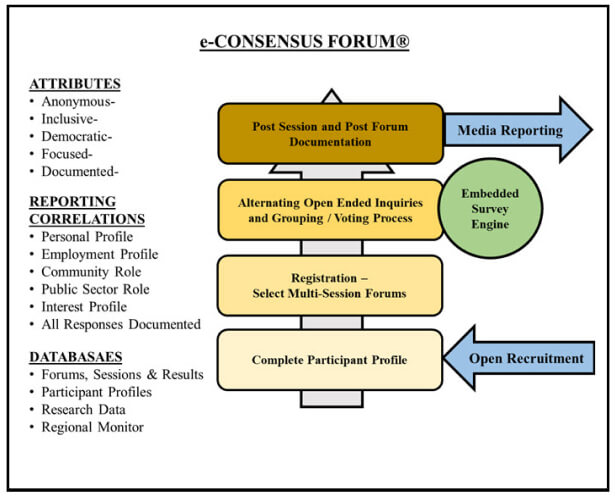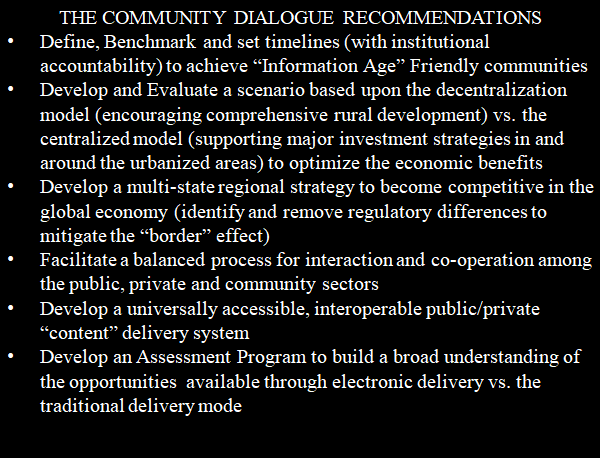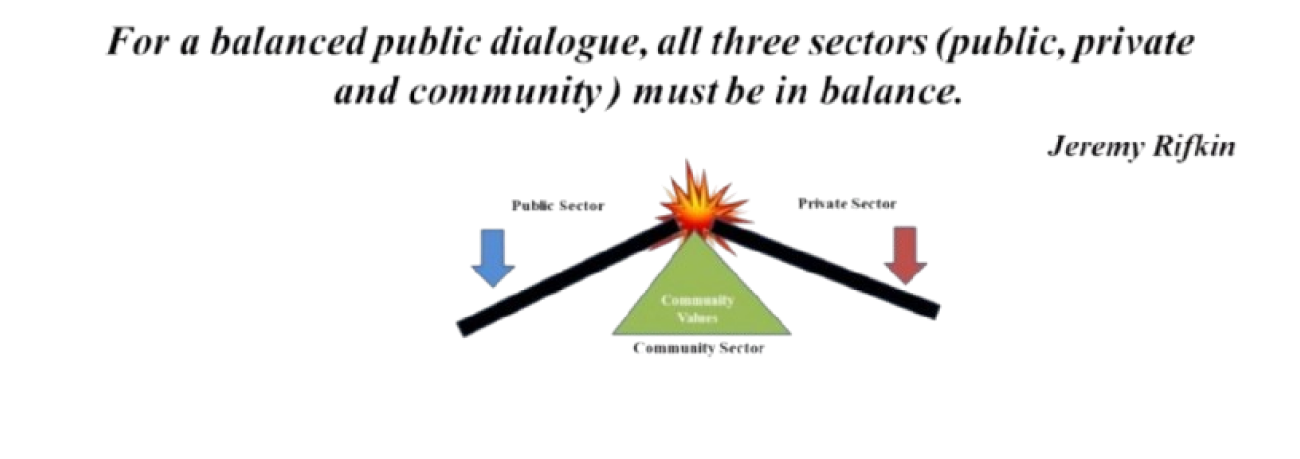Many tools are only valuable in that split second of time, but offer no reliable long term understanding from their results.
Townhall meeting- single event in which the leader provides background information on their plan. The participants ask a few uncoordinated questions. Meeting Adjourned
Focus groups- support table discussions after which the tables report a few highlights, but the really important details are left on the floor…and there is rarely follow-up.
Polls and surveys- often reflects the inherent bias of the author's interest. They are a moment in time snapshot.
TCR’s requirements needed a more effective tool to document what the community recommends. We developed the e-Consensus Forum® and the Regional Monitor® to gather the information and focus the discussion.
The e-Consensus Forum is a powerful tool with its unique set of attributes, reporting capabilities and statistical data structure. It takes the time to understand an issue and how the participants choose to resolve it.
The forum is perhaps the only process that begins with a fact sheet/white paper on the issue to enhance the knowledge base for the participant responses.

The e-Consensus Forum has many applications:
Developing recommendations on policy
Allocating funds to program priorities and project programming
Developing specifications for a new product
Supporting the Community Voice
Establishing Guidelines for the Workforce Virtualization Program's Deployment Plan,
and many more.
The e-Consensus Forum ® is different, its attributes ensure that the discussion is relevant, the sequence of the forums generates a solution by agreeing on a strategy with specific implementation tactics and identifying the responsible parties. It defines a resolution and an implementation path.
The e-Consensus Forum builds profiles for participants, the forums, and the forum’s individual sessions. The system correlates the data to generate statistics and potential participant bias. It is important to understand when drawing conclusions about a Forum’s outcome.
TCR’s Community Dialogue Process was driven by this powerful tool. The results became TCR’s workplan.

Both the Public and Private Sectors have powerful implementation structures. Although the former is ultimately controlled by “the vote”; that system is upside down. Instead of the citizens telling the government what it wants done, the government offers a “message” about what it will do “for you” and the important issues are oft absent from the public dialogue.
Although the Community Sector, directly or indirectly, pays all of the Public Sector’s taxes and pays for all the costs of the Private Sector, it has become structurally powerless. Given the level of confidence that the public has in the other two sectors, it is critical that the Community develops a voice to “raise the bar”.

With faith in government at 16% The Pew Research, Report: June 24, 2024 and the Public Trust in Government: 1958-2024. As of April 2024, 22% of Americans say they trust the government in Washington to do what is right “just about always” (2%) or “most of the time” (21%). Last year, 16% said they trusted the government just about always or most of the time. This was among the lowest measures in nearly seven decades of polling.
And faith in our institutions at (26%) Gallup Poll, July,2023 Historically Low Faith in U.S. Institutions Continues The historically depressed nature of today’s ratings is evident in the average confidence scores of nine institutions that Gallup has routinely tracked since 1979. That average fell to a new low of 26% this year. While down just one point from 2022, it is 10 points lower than in 2020.
The two political parties fight for the supremacy of their ideology and only rarely does their leadership’s values coincide with the values of the Community.
Generally, citizen’s reach out to their government officials and foundations when they need assistance. Perhaps it is time for them to look to themselves and their local community to address those needs, collaborate with other communites and rely less on the bureaucracies.
Phone Number
Jfsanger@telecommuter.org
4315 Virginia Avenue St Paul, MN 55126
The Information Age Community incorporates AI in many of its tools and strategies. It truly allows society to embrace the many benefits of the Information Age and the Freedom of Residential Choice that it provides. All six community types are affected by this reversal of the 200 year Industrial Age mindset and each must build upon the benefits of the old even as they adopt the new opportunities.
©All rights reserved,2025 Tele-Commuter Resources,Inc. Design and development by VibgyorWeb Technologies.